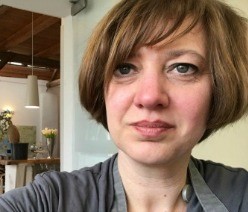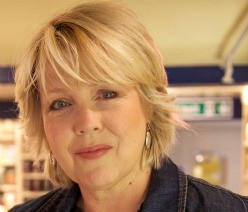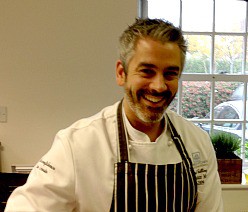Philipp Kauffmann, founder of Original Beans, interviewed by Cat Black
April 10, 2012
Philipp Kauffmann is CEO and founder of Original Beans, a multi-award winning chocolate company dedicated to making superb chocolate, pioneering sustainable farming, and prioritising rainforest conservation.
Categories:
-
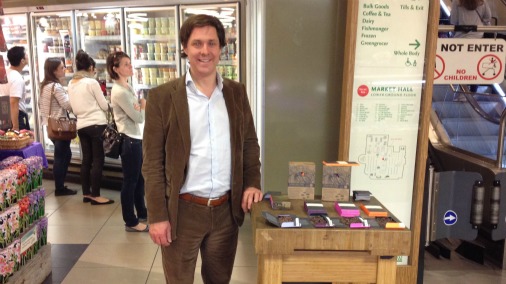
Cat Black: What were you doing before you started Original Beans?
Philipp Kauffmann: I started academically as a development economist. I was interested in how developing economies grow. Then I became an internet entrepreneur in the 90s, in the first wave of it, for about four years, and then I decided that that market and the technology wasn’t for me. I had a calling for nature. So I sold my shares in the company, and after half a year of thinking and working out what I wanted to do, I got a job at the World Wildlife Fund. At this point I had already decided it was going to be nature conservation. Because I think the biggest theme for our time, and for the next generations, will be our relationship to our planet and all the others species. I worked for WWF for a couple of years and then I worked for the UN in their development programme in the environmental department for a couple of years. Always at the edge where the market meets conservation. Asking how can you integrate the big questions of our ecology into our consumer society?
CB: So how did you go from there, from the UN, to start Original Beans?
PK: I had a lot of relationships in the grower community and in the conservation community, so on the ground. And I was very curious to see how we could translate this into a real serious consumer proposition. I met somebody who is an expert in organic foods, and she helped to develop the brand, and Original Beans was the result. It needs to start where as consumers we have a different moment of choice.
CB: To me, who is a consumer, your chocolate is just better than most. Even though you put the conservation first.
PK: It has to work for the consumer. And we plant one tree per bar and there is a help for farmers to replant and stop slashing the rainforest. I want to combine serious ecology with serious chocolate.
CB:Were you a foodie beforehand?
PK: I wouldn’t call myself a foodie, but I was very conscious of food and I have always loved chocolate. I have always loved wine and I do have a good palate. I have never trained for chocolate or food.
CB: So why chocolate? Why cocoa?
PK: I already knew a lot about cacao. The cacao tree has always fascinated me. Trees in themselves, forest and agri-forests that can be managed by small farmers, are undervalued. If you look at our mythic plants they are all trees. The apple tree, the olive tree, the cherry tree in Japan. And the cacao tree is exactly like that but from the tropics. Of course it was mythic to the old Latin American culture. I think it is because they produce, but they produce so many other things like habitat, shade, smell and flowers.
We just know it is so pleasant to be in an apple garden or in an olive garden or in a cacao garden. So it has a very powerful ecology, and because it is in the tropics with remote farmers, it has a powerful impact on the poorest of the poor.
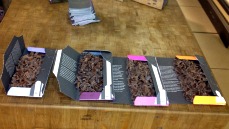
Ready for tasting
So on the producer’s side I think it is a magic tree with magic opportunities to change things in the rainforest, where conservation needs to happen. And the wonderful thing on the consumer’s side is that it’s a great charismatic product that everybody loves.
CB: What’s been your greatest discovery since you started Original Beans?
PK: The greatest discovery is how difficult it is to reach the consumer and clarify messages. Because we live in such a saturated consumer society. I always say that I don’t think we need more chocolate, I think we need more conservation. But then when you have a chocolate bar and you need to compete in the chocolate section it is difficult. How to get to a consumer and then have a clear message. Today I saw the draft of a chocolate bar for a pretty well known food franchise and on the back of the bar it says ‘this is produced in our tiny chocolate kitchen’. I know the factory where this is produced and it is not a tiny kitchen! There is so much misinformation. People, marketers, don’t hesitate in stating lies. That confusion and overload is not something I could have anticipated.
CB: It strikes me that if you can put ‘ethical’ or ‘artisan’ on something mass made and sell it for a pound, then it makes it harder for something that is really precious. Something that has taken its time and been sourced correctly and made by people who are paid adequately. It then makes it harder for people to accept a package price that is correct for that. Having said that, the chocolate market has changed in the last ten years. Where do you see it has changed?
PK: Well of course it has changed a lot in getting away from chocolate being a Cadbury bar, of no denomination, and lots of milk and nuts. Many consumers, if still a minority, know there is an ecology behind the product, that there is a supply chain, that there is sophistication, denominations of origin. So that has changed a lot. What has also changed, but not as much as I would hope, is the price. What you have seen in coffee is that, essentially Starbucks, has helped to free the coffee market of restraints. By saying this cappuccino costs $3.50, on a massive scale, the small coffee shops can build on that. In the chocolate industry, Green & Blacks has helped. But it is still much too low. That is one of the dirty secrets of the chocolate industry, few people like to talk about it. It needs to be more expensive in order to be in any way fair. Fairtrade premiums are ridiculous, they still don’t help farmers to get over a dollar a day.
CB: That is no good at all. So, where do you think the market is going to go next?
PK: Chocolate as we know it is a highly manufactured, industrial product, so far. The units are getting smaller. There are a lot more small producers, that is already starting to happen.
CB: Like Oialla and Duffy Sheardown. And there are lots in America.
PK: In America there is a scene of really really good chocolate now.
CB: I was just tasting Amano.
PK: Amano is really good, Askinosie is good, Patric chocolate is good. Mast Brothers, I don’t like the chocolate so much, but they are interesting nonetheless. All of them are making from bean to bar. There are some even smaller than that. People making raw chocolate, who buy beans, then grind them, and then have their own chocolate. I think when it comes to real, quality chocolate there is still a degree of machinery capital involved. You need really good roasting, you need really good grinding, you need really good conching. And you can’t do that in the back of your kitchen. So if the price doesn’t go up, these will be very artisanal projects. But it will mean people can go “Oh wow, I just had this chocolate from Hawai!” It is a little bit like the coffee world, there will be some artisanal mid-size companies, and then you will have the very small ones cropping up here and there. I think that’s happening already. And then certification is the next thing that is going to develop. Fairtrade and organic is going bigger with more mainstream companies.
CB: From my point of view, from tasting, you might admire it but it might not taste any good, the texture might not be any good. People knowing about the ecology is one thing, but changing people’s perceptions enough to make them pay more needs something else too. They need to see as a fine food. Percentage was a big media story, but what many people don’t know about is all the differences in taste. That to me is like wine, like the wine market was in this country 20 or 30 years ago when people in this country drank beer, and wine was a bottle of plonk.
PK: 100%, yes.
CB: So we need people like Martin Christy who, on his website 70%, is doing amazing, very academic tasting.
PK: And it can also be done with a language that gets people started with the basics. That can help people to tell their own stories about whatever they taste. Having said that, I don’t think there are so many chocolate makers now who are capable of actually working that out of a bean. Like the really good wine makers, there are very few. Looking at this shelf here, it is a good shelf (we are looking at the display of chocolate bars in Wholefoods Kensington). Valrhona can do it, Amadei can do it, Francois Pralus, Michel Cluizel. There are of course others.
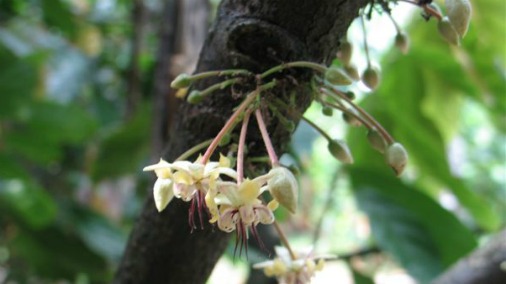
Cocoa Tree in Flower
CB: There are a lot of great things to taste here.
PK: And there are already a couple of classics. I always thought that Green & Blacks, while they are not fine wine, I think they helped a lot. I like Maya Gold, its good chocolate, it was the first Fairtrade organic, at end of the 90s.
CB: Last time I saw you, you were excited about your new packaging, the foil you had developed.
PK: We have just come out with the first foil in the chocolate industry that is made from trees. This is made from wood, with a thin layer of aluminium, which is non-toxic, and you can put it in your garden compost. It is biodegradable. I am currently testing how long it takes to decompose. It has been on my terrace for two months and it is weak now, slowly melting.
CB: What are your other plans for Original Beans?
PK: For us the basis is conservation. We don’t buy beans and make bars. We try to protect rainforests and make a tasty bar. So for us to come up with a new origin is a long project. We are constantly doing it, we are constantly looking to develop projects and beans. Sooner or later there will be another Original Beans origin. At the same time we are thinking how can we extend recipes for our existing beans. Which is not easy, because we don’t want to be gimmicky. There are a few ideas.
CB: So you want to consolidate the four origins you have, the four bars you make. But you can’t tell me the other plans, because if you did you would have to kill me. It is top secret!
PK: It is not top secret, but we don’t even know yet. It takes a long time because we need projects that can continue, that can heal places. So the more of this existing chocolate we can sell, the more trees we plant, the more money goes back. We really want that. We are also looking at drinking chocolate from the Virunga, it is a brilliant chocolate for that.
CB: It is a brilliant chocolate for cooking. It is the chocolate I cannot live without. I always have stacks of it at home, and if I make a dark chocolate tart nothing is better. Finally, what’s your desert island chocolate and why?
PK: I don’t have a desert island chocolate. I have to say that I have a time of the day chocolate. I would need to have a stack of chocolate on the desert island. I really like Original Beans, but there are a couple of other bars that would be also in the pack. For instance for me the Beni is a typical morning chocolate. Esmerelda is my super comfy food, if I feel a little bit down and I need an espresso and a sweet kick. So I would go with a stack. In terms of origins of beans I also couldn’t say. There is so much to discover. I hope it will be a pretty big island for all the chocolate I would take there.
To contact me… cat@chocolatecouverture.com

 I am a food writer, with special interest in, and huge enthusiasm for, chocolate! This blog is where I get to tell you about all the wonderful tastes, events, and people I come across in the world of chocolate.
I am a food writer, with special interest in, and huge enthusiasm for, chocolate! This blog is where I get to tell you about all the wonderful tastes, events, and people I come across in the world of chocolate.